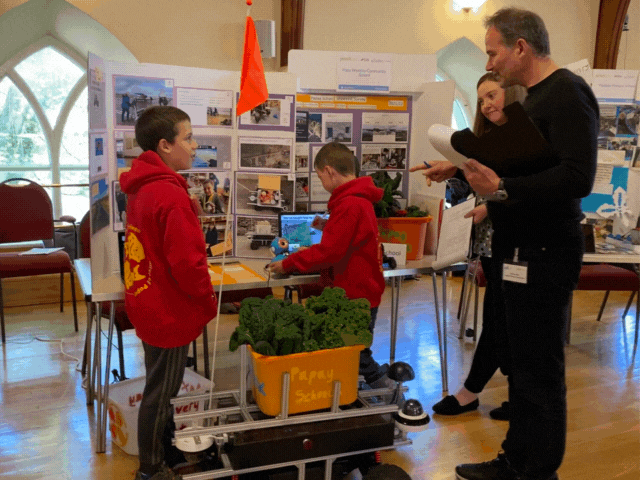Nothing artificial about the intelligence at Papay School as staff and pupils train Max the robot!
Date: 22 August 2022

There’s been a new “pupil” at Papa Westray Community School for some time now – and Max the autonomous – or self-driving – vehicle has proven to be a star student!
While Max has been trained to carry out different tasks – pupils and staff have also been on an exciting new journey thanks to being part of the international pilot research project exploring the use of autonomous vehicles (AVs).
Head Teacher Tim Ross said: “We were fortunate to receive one of the three robots that came to Orkney as part of the trial. The main targets were to demonstrate the principle and viability of the technology. The children spent the year progressively learning how he worked, training him to do simple 'routes' and eventually trained him to drive to and from the local shop without assistance, resulting in the delivery of school lunch ingredients one day! It has been a great achievement.”
The Papay pupils shared their highlights.
A P7 student said: “The most exciting part was after teaching Max what to do, watching him heading off on the road and actually doing it. It was quite amazing at first when we watched him go to the shop. We thought he wouldn’t manage, but he did! We were all quite happy.
“Learning about Max has made me more interested in robotics and computer programming.”
Using gaming controllers at home certainly helped the pupils control Max, they said.
A P5 pupil added that the best part of the project was watching Max go up the hill to the island shop.
“I was happy in my head,” he said. “Max is like having another friend at the school. It’s been good fun learning how to make him work.”
Mr Ross explained how they got to the point of Max heading to and from the shop on his own.
“When Max is driving himself along, he is using cameras and artificial intelligence to decide where to go. He makes decisions based on his previous experiences. We’ve trained him by driving him along chosen routes numerous times in different conditions and at different times of day. As a result, he now recognises locations in Papay and can be instructed to drive along our selected routes.
“We started by learning how to control him carefully inside. He uses a Playstation 4 controller and is very instinctive to use like a remote-control toy car. The children all had a chance to control Max in real time in order to get used to his controls.
“Then we progressed to training Max more carefully with the target of him driving on his own. The children achieved first success just before Christmas, training him to drive around the school hall. This was a real achievement and gave us confidence for pushing on and being a bit more adventurous.
“Next, we trained Max to head to the local shop, following the grass verge and negotiating obstacles and junctions on the route. It felt like a huge success on the day when he was able to navigate and drive himself to and from the shop without any assistance. This resulted in the delivery of school lunch (and celebratory ice cream), a real success story!”
Max has also been on his travels to Mainland Orkney, when he was shown at a schools’ Celebration of Engineering event in Kirkwall.
Mr Ross said: “We had a great day out, with a chance to show Max to interested folk, whilst also learning about engineering as a profession, with lots of fun activities for the children to have a go at. There were some great science projects from schools across Orkney. Hopefully this will become an annual event.”
Orkney is part of the Planning for Autonomous Vehicles (PAV) project involving four pilot projects running in the North Sea region looking at how autonomous vehicles could interact with existing modes of transport.
Hitrans – the Highlands and Islands Transport Partnership, which Orkney is part of – are the lead partner in the project, alongside the Hannover Region in Germany, Almere City in the Netherlands and Varberg Municipality in Sweden.
In Orkney, small AVs have been undergoing initial trials for logistics and freight purposes, such as the transport of general supplies, luggage, parcels, waste and other goods.
More Work Less Carbon, a company based in Utrecht, Netherlands, supplied the AVs. In addition to Papay School, they have worked closely with the Robert Gordon University (RGU) and Orkney Research and Innovation Campus (ORIC) LLP at their campus in Stromness, where the other two AVs were trialled.
If anyone would like the chance to meet Max, Mr Ross and the pupils will be at a Science Festival event in the Pickaquoy Centre on Tuesday 6 September at 11.30am.





